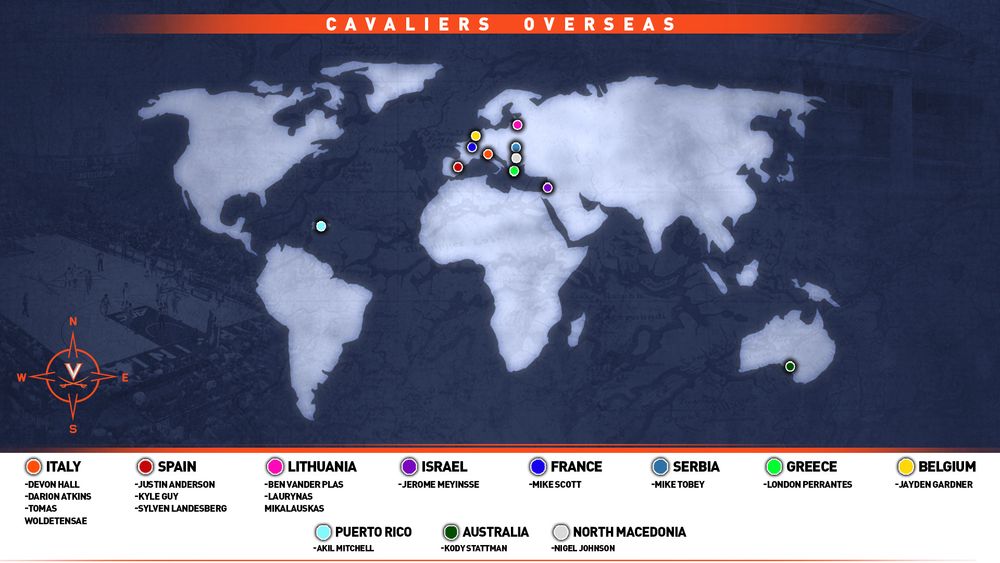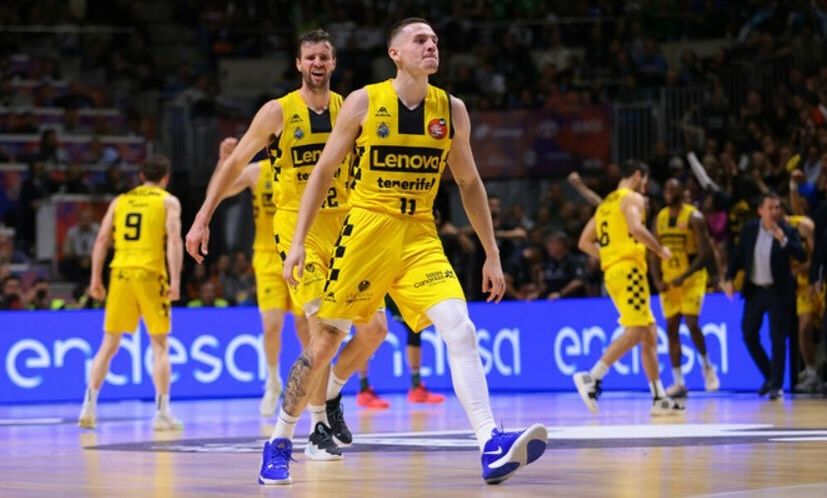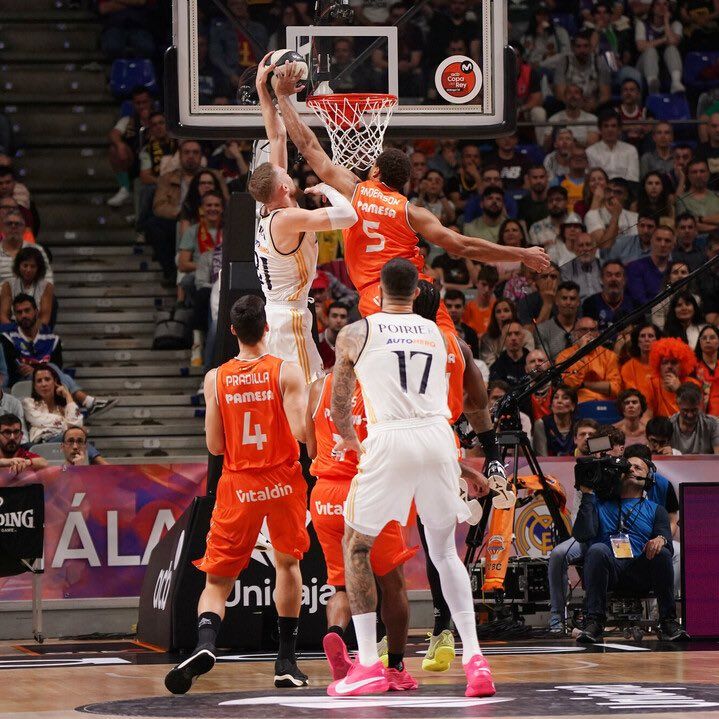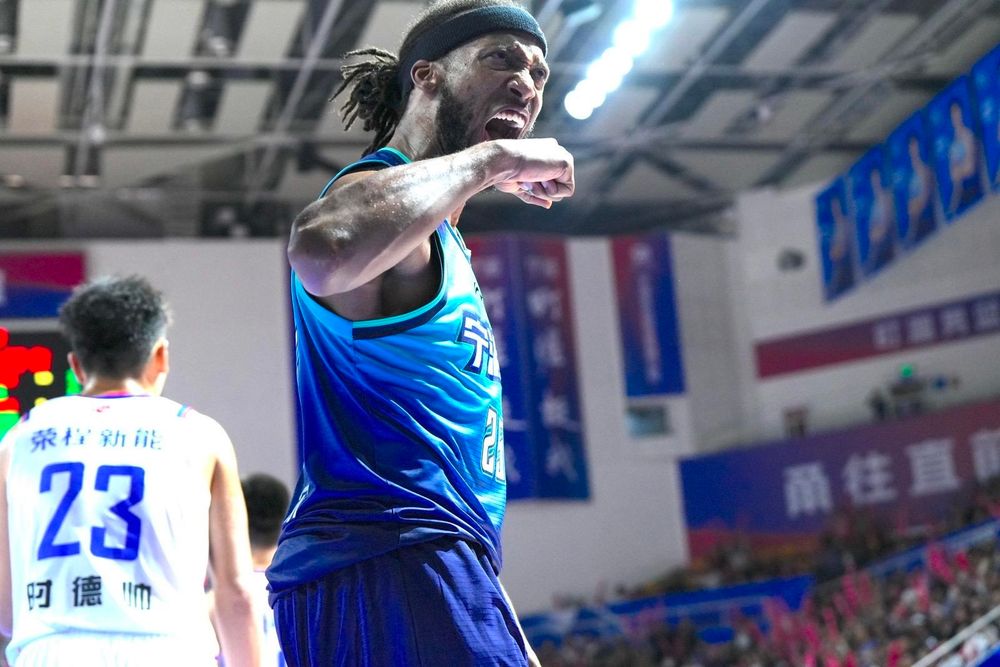🔥 El primer cuarto de @kylejguy en Bursa 🔥
🟡 17 puntos
⚫️ 2/3 T2, 3/6 T3 y 4/4 TLpic.twitter.com/y5lvXebijd— Gigantes del Basket (@GIGANTESbasket) April 10, 2024
Hoos' Reach in Hoops Spans the Globe
By Jeff White (jwhite@virginia.edu)
VirginiaSports.com
CHARLOTTESVILLE, Va. — Play hoops, see the world.
For most men’s basketball players, the NBA remains the ultimate goal, and the University of Virginia is well-represented in that league, with six alumni on playoff teams alone. But attractive and, often, lucrative opportunities to play professionally also exist beyond North America, as many former Cavaliers can attest.
“You realize there’s another world outside of the NBA,” former Virginia guard Devon Hall said.
This season finds Hall, Darion Atkins and Tomas Woldetensae playing in Italy. Justin Anderson, Kyle Guy and Sylven Landesberg are in Spain. Ben Vander Plas and Lars Mikalauskas are in Lithuania, and Jerome Meyinsse is in Israel.
Mike Scott is in France, Mike Tobey in Serbia, London Perrantes in Greece, Jayden Gardner in Belgium, Akil Mitchell in Puerto Rico, Kody Stattmann in Australia, and Nigel Johnson in North Macedonia.
“What a way to see the world and experience it,” UVA head coach Tony Bennett said. “They’ve carved out unbelievable careers, a lot of them have. Financially, they’ve made good money because they’ve been the consummate pros. They come over there, they treat people well, they work hard, they play the game the right way.
“Everybody dreams of the NBA over here, but to have a long, prosperous career in this game and get to experience different parts of the world and then save some money, all that stuff, that’s significant. And so when you add all of our guys in the NBA and all of them that are playing internationally, it’s amazing.”
Several of the UVA alumni playing overseas have NBA experience, including Anderson, Guy, Scott, Hall, Perrantes and Tobey, and that’s given them valuable perspective.
“Listen, if the NBA offered me a contract, I’d take it in a second. That’s where 99.9% of people want to play—in the NBA—and I still do,” said Guy, who’s now with Lenovo Tenerife after playing for another Spanish club, Joventut Badalona, in 2022-23 and for Panathinaikos in Greece earlier this season.
“But I did everything in my power. I proved myself at that level, and it still didn’t work,” said Guy, one of the stars of the UVA team that won the NCAA title in 2019. “So I accepted my time in the NBA had come to an end, and sometimes that’s the way life is. So I’m taking this one day at a time. I just take it all in and really try to enjoy the moments, enjoy the experience that I’m getting to do.”
Hall, who spent five years in Bennett’s program, was picked by the Oklahoma City Thunder late in the second round of the 2018 NBA draft. He didn’t join the organization immediately. But after playing professionally for six months in Australia, Hall finished the 2018-19 season with the OKC Blue, the Thunder’s G League team.
In 2019-20, Hall made his NBA debut. He appeared in 11 games with the Thunder that season, six of them in the “bubble” the league established in Orlando, Fla., during the COVID-19 pandemic.
“That was a great experience,” Hall recalled.
He became a free agent after the 2019-20 season but attracted little interest from NBA teams, and so he decided to follow a different path.
“I was like, ‘I don’t want to have to keep going back and forth to the G League. Let me see what overseas is like,’ ” Hall said. “I’ve always had that mindset of, if you’re good enough player, the NBA will find you. It doesn’t matter where you are. So I was going to go embrace the European culture, find out what the game is like, and try to be the best version of myself that I could, try to grow and get better.
“I wasn’t saying, OK, to hell with the NBA. It was more so, let’s see where this takes me. I want to play basketball at the highest level. If that doesn’t mean I’m playing in the NBA, well let me see if I can get to the EuroLeague and see if I can play at the highest level in that fashion.”

After signing with Brose Bamberg, Hall played in Germany in 2020-21. “That was a new experience for me,” he said. “I was just trying to soak in everything, the European style of the game, just the culture. I couldn’t do it as much because it was COVID, so a lot of stuff was closed. But I was able to play more with the ball and make more plays, score the ball.”
Players in Europe frequently change teams, and Hall moved to Olimpia Milano in Italy before the 2021-22 season. In the summer of 2022, he signed a two-year extension with the club, and he’s enjoying life in Italy.
“It’s a very, very beautiful city,” Hall said of Milan.
European teams compete in their domestic leagues—in Milano’s case, Serie A—and also in competitions across the continent. The top tier is EuroLeague, followed by EuroCup and then Champions League.
Guy, who spent three seasons in the NBA after being picked late in the second round of the 2019 draft, has played in all three of those competitions, as well as in domestic leagues in Greece and Spain.
“I love it,” he said, “because I like to travel. I like seeing new places. The lifestyle is amazing. We’re playing really good basketball. Everyone knows how to play the right way. So I’ve thoroughly enjoyed my experience over here.”
Guy grew up in Indianapolis. Hall is from Virginia Beach and hadn’t visited Europe before the Cavaliers toured Spain in the summer of 2016.
Playing outside the United States, Hall said, “just opens your mind, I think, in terms of realizing there’s a different way of living, a different style of food. The speed of life and the culture and I guess the architecture are also different. The way of living is different. Most people don’t live in houses, they live in condos and apartments. So it’s just a different style of living that you have to appreciate and respect. You don’t just come here and say, ‘Well, this is not like America.’ Of course it’s not like America, but this is what you chose to do. So you respect it and you live a certain way.”

Kyle Guy
Anderson, a first-round draft pick of the Dallas Mavericks in 2015, played in the NBA for six seasons and also has extensive G League experience. He made his debut in Europe last fall, playing for Río Breogán, before signing with another Spanish team, Valencia, in late December.
His experience in Europe has made him “realize that the game is a lot bigger than just the USA,” Anderson said.
“There’s guys over here that can jump too. There’s guys over here that can run the pick and roll and pass no-look too. We see it [in the NBA] with Luka [Dončić]. We see it with [Nikola] Jokić. We see it all over and it’s eye-opening, because it’s another level of basketball that I think the world is going to see soon because of how skilled players are.”
Justin Anderson siendo Justin Anderson 🤪
🧡 @JusAnderson1 🧡
📷 @miguelangelpo67 pic.twitter.com/3M1WNzBVtj
— Valencia Basket Club (@valenciabasket) April 7, 2024
Rabid fan bases are common in Europe, as Anderson learned quickly. During Río Breogán home games, “I’d just be thinking to myself, ‘Man, I’m glad that they’re on my side,’ ” Anderson said. “The arena was jumping; you could feel the vibration on the court from the support.”
When Anderson was a Cavalier, some of his most memorable performances came away from John Paul Jones Arena, against teams like Virginia Tech and Maryland. He loves playing in front of the hostile crowds he’s encountered on the road in Spain.
“It brings out the best in me,” Anderson said. “The environments are crazy, but it’s fun.”
Guy still marvels at the storied rivalry between Panathinaikos and Olympiacos in Greece. “Any time that they play, you’re talking top-three atmosphere on earth,” he said. “And I’ve also played against Partizan, which is in Belgrade. It’s also one of the most historic clubs and that’s No. 1 in the world for basketball atmosphere. One hundred percent. They don’t allow other teams’ fans in [the arena], because it’s that crazy.”
Mitchell remembers playing a game in Greece in a gym that “couldn’t have held more than 2,000 or 2,500 people, so they’re right on top of you. I didn’t understand it, everybody was speaking in Greek, but there was something political going on, and they were throwing fireworks onto the court. They were holding some doll from a noose and swinging it. They had to stop the game multiple times. We ended up winning and there was no shower, no nothing [afterward]. Just get out of there. Just get straight to the bus.”
He laughed. “It gets wild, man. It gets nuts. It’s a lot of fun, though.”
Mitchell was part of Bennett’s first recruiting class at UVA and helped the program become nationally prominent. After graduating in 2014, he played for Rio Grande Valley, the Houston Rockets’ team in what is now the G League, and then headed overseas, first to France and then to New Zealand.
Another G League stint followed, after which Mitchell began a professional journey that’s included another stop in France and stints in Italy, Israel, Turkey, Germany, Greece, China and Puerto Rico.
“I’ve been everywhere,” Mitchell said. “I’ve been to every continent to play basketball.”

Justin Anderson (5)
When he left Charlottesville, Mitchell said, he had little idea that pro basketball’s reach was so wide.
“Definitely not,” he said. “Even now, 10 years later, I’m still learning, like, all right, they have a league in Mongolia that’s paying $200,000 a year that I had no idea about. I knew that playing in Europe was an opportunity. I definitely did not understand how complex it was or how many opportunities there were, though.”
Bennett, who played professionally in New Zealand after his NBA career ended, has recruited several international players during his tenure at Virginia, including Jack Salt, Mamadi Diakite, Francisco Caffaro, Taine Murray and Stattmann. Moreover, five members of Bennett’s staff—Jason Williford, Ron Sanchez, Johnny Carpenter, Isaiah Wilkins and Stelios Tzoutzis—played or coached overseas.
“We always had people from different countries,” Guy said. “So that’s probably the first point where I realized [the popularity of basketball]. I think I knew it was global, but I didn’t understand the extent of it … But like you’re seeing now, there’s so many overseas players that are starting to crack in the NBA, and obviously some of the best players in NBA right now are Europeans.”
It’s not uncommon for former Cavaliers to find themselves on opposing teams in Europe. Hall has fond memories of playing against Wilkins, Guy and Anderson there.
“We played Justin’s team in Valencia, and the next morning we went to breakfast close to the beach,” Hall said. “It was cool. So just running into those guys and seeing those familiar faces is dope for me.”
In Europe, especially, the caliber of play is high and ever-improving.
“It’s their academies,” Guy said of the system in which young players develop. “Listen, pound for pound the best basketball players are still in the United States. But the thing is, the way they’re coached [in Europe], they’re coached about how to play basketball first, and then they work on the individual skill set.
“I feel like in the States it’s the opposite. [In Europe], your 5-man knows how to pass, your guard knows where everyone’s supposed to be. The rhythm and the feel and the energy and flow of basketball is a little smoother over here off the jump. Now, the skill sets of some players are lower, because they weren’t brought up learning those individual skills yet. But if the States can find the balance, then it’s going to be in good hands for a long time.”
Multimillionaires abound in the NBA. Salaries aren’t as lavish overseas, but taxes are often much lower than in the U.S., and teams typically pay for players’ housing and cars, “so you really don’t have a lot of expenses,” Guy said.
“I’m thankful,” Hall said. “Nobody’s making 100 million [dollars], nobody’s making 50 million in Europe. It’s completely different. But don’t get it twisted. You can make some real money so that if you take care of it and you invest it the right way, you shouldn’t really have to do too much work [after retiring from basketball].”
Mitchell turns 32 in June, and his playing career is winding down. It’s been a fun ride for him, and he’s thankful that his time in Bennett’s program helped prepare him for a long pro career.
“It’s the best job in the world,” Mitchell said. “People lose sight after the NBA of how many other opportunities there are, but there’s guys living around the world, making really good money, and enjoying life. You can’t complain about it.”
To receive Jeff White’s articles by email, click the appropriate box in this link to subscribe.

Akil Mitchell


